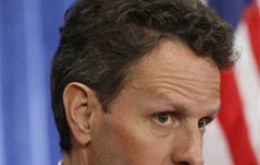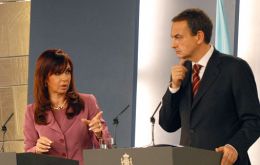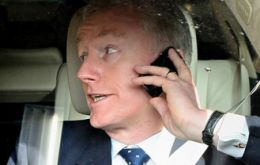MercoPress. South Atlantic News Agency
Economy
-
Thursday, February 12th 2009 - 20:00 UTC
Panama Canal forecasts 5% drop in cargo tonnage

The global slowdown have influenced estimates of the Panama Canal Authority, CAP, which now forecasts a 5% drop in cargo tonnage going through the waterway in 2008-2009. This represents a decrease close to 19.9 million tons, leaving a total of 294.1 million.
-
Thursday, February 12th 2009 - 20:00 UTC
FAO predicts fall in global cereal crop and hunger threat

Bad weather, violent conflict and volatile market prices could force a drop off in the global production of cereal crops this year, the United Nations Food and Agricultural Organization (FAO) predicted Thursday after already warning that some one billion people worldwide are going hungry.
-
Wednesday, February 11th 2009 - 20:00 UTC
Geithner unveils 1.5 trillion bail-out plan and toxic fund

Treasury Secretary Timothy Geithner has unveiled a comprehensive bank bail-out plan worth at least 1.5 trillion US dollars. Under the plan, the size of a key Federal Reserve lending program will be expanded to 1 trillion from 200 billion.
-
Wednesday, February 11th 2009 - 20:00 UTC
Argentina and Spain admit difficult economic relations

Visiting Argentine president Cristina Fernández de Kirchner and Spanish president Jose Luis Rodriguez Zapatero, admitted on Tuesday difficulties in the economic relations but emphasized that bilateral relations are excellent.
-
Wednesday, February 11th 2009 - 20:00 UTC
As exports contract China's imports plunge 43% in Jan
China's exports fell more than expected in January, down 17.5% from a year earlier, while imports plunged 43.1%, , as China's economy continued to be hit by the global economic slowdown.
-
Wednesday, February 11th 2009 - 20:00 UTC
HBOS “too-rapid growth” investigation in the limelight

The former head of risk at Britain's HBOS, who claimed he was sacked for warning about the bank's too-rapid growth, has said he stands “firmly and confidently” behind his allegations.
-
Wednesday, February 11th 2009 - 20:00 UTC
UK unemployment surges to new ten year high

United Kingdom jobcentres were said to be “creaking” under the pressure of work as new figures showed unemployment surging to a 10-year high. The jobless total reached 1.97 million, confounding many experts who had predicted it would break through the two million barrier.
-
Tuesday, February 10th 2009 - 20:00 UTC
China's January car sales overtake US, leading world market

China car sales topped the US for the first time last January totalling 735,500, a 14% drop, the China Association of Automobile Manufacturers said on Tuesday in an e-mailed statement today. That compares with a 37% plunge to 656,693 in the US, the world's largest auto market last year.
-
Tuesday, February 10th 2009 - 20:00 UTC
UK bank bosses told Parliament they are “profoundly sorry”

Former bosses at bailed-out banks Royal Bank of Scotland (RBS) and HBOS have said they are “profoundly sorry” and admitted they under-estimated the extent of the financial crisis.
-
Monday, February 9th 2009 - 20:00 UTC
Tractor and combine sales forecasted to fall 30% in S. America

United States Agco Corp. warned that industry-wide farm-equipment sales in South America could fall by almost a third this year due to drought and tough credit conditions.
